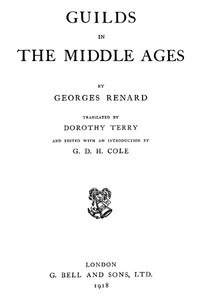Guilds in the Middle Ages by Georges François Renard
Read now or download (free!)
| Choose how to read this book | Url | Size | ||||
|---|---|---|---|---|---|---|
| Read online (web) | https://www.gutenberg.org/ebooks/45425.html.images | 360 kB | ||||
| EPUB3 (E-readers incl. Send-to-Kindle) | https://www.gutenberg.org/ebooks/45425.epub3.images | 158 kB | ||||
| EPUB (older E-readers) | https://www.gutenberg.org/ebooks/45425.epub.images | 161 kB | ||||
| EPUB (no images, older E-readers) | https://www.gutenberg.org/ebooks/45425.epub.noimages | 159 kB | ||||
| Kindle | https://www.gutenberg.org/ebooks/45425.kf8.images | 282 kB | ||||
| older Kindles | https://www.gutenberg.org/ebooks/45425.kindle.images | 251 kB | ||||
| Plain Text UTF-8 | https://www.gutenberg.org/ebooks/45425.txt.utf-8 | 301 kB | ||||
| Download HTML (zip) | https://www.gutenberg.org/cache/epub/45425/pg45425-h.zip | 145 kB | ||||
| There may be more files related to this item. | ||||||
Similar Books
About this eBook
| Author | Renard, Georges François, 1847-1930 |
|---|---|
| Editor | Cole, G. D. H. (George Douglas Howard), 1889-1959 |
| Translator | Terry, Dorothy |
| Title | Guilds in the Middle Ages |
| Note | Reading ease score: 54.6 (10th to 12th grade). Somewhat difficult to read. |
| Credits |
Produced by Chris Curnow, Paul Clark and the Online Distributed Proofreading Team at http://www.pgdp.net (This file was produced from images generously made available by The Internet Archive) |
| Summary | "Guilts in the Middle Ages" by Georges François Renard is a historical account presumably written in the early 20th century, focusing on the organization and function of guilds during medieval times. The text delves into the complexities of guild systems, which were crucial economic and social structures in the Middle Ages, and their role in industrial economy. The guilds are depicted as both self-regulating units and organizations influenced by local and national authorities, reflecting the interplay between production, trade, and the evolving nature of societal roles. The opening of "Guilds in the Middle Ages" presents an overview of the historical context and discussions surrounding the origins and geographical distribution of guilds. Renard outlines competing theories regarding their emergence, suggesting a dual nature: on one hand, they may have evolved from earlier associations; on the other, they could represent unique institutions born from the need for collective defense and mutual assistance among craftsmen. The introduction sets the stage for a more in-depth analysis of the guilds' structure, organization, and the functions they served within society, emphasizing their significance in the broader narrative of medieval economic history. (This is an automatically generated summary.) |
| Language | English |
| LoC Class | HD: Social sciences: Economic history and conditions, Production |
| Subject | Guilds -- History |
| Category | Text |
| EBook-No. | 45425 |
| Release Date | Apr 17, 2014 |
| Copyright Status | Public domain in the USA. |
| Downloads | 131 downloads in the last 30 days. |
| Project Gutenberg eBooks are always free! | |

